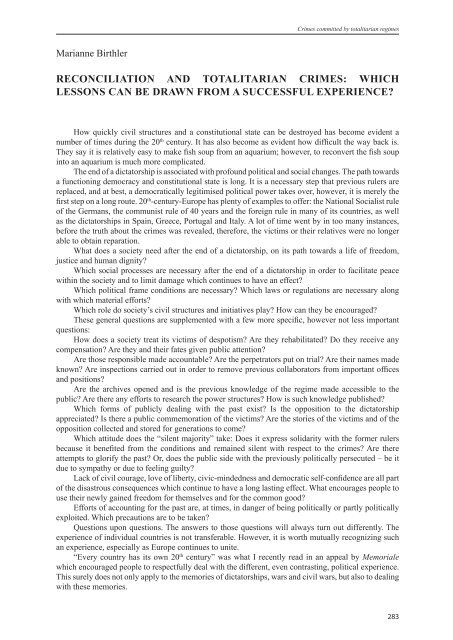crimes committed by totalitarian regimes - Ministrstvo za pravosodje
crimes committed by totalitarian regimes - Ministrstvo za pravosodje
crimes committed by totalitarian regimes - Ministrstvo za pravosodje
You also want an ePaper? Increase the reach of your titles
YUMPU automatically turns print PDFs into web optimized ePapers that Google loves.
Crimes <strong>committed</strong> <strong>by</strong> <strong>totalitarian</strong> <strong>regimes</strong><br />
Marianne Birthler<br />
Reconciliation and <strong>totalitarian</strong> <strong>crimes</strong>: which<br />
lessons can be drawn from a successful experience?<br />
How quickly civil structures and a constitutional state can be destroyed has become evident a<br />
number of times during the 20 th century. It has also become as evident how difficult the way back is.<br />
They say it is relatively easy to make fish soup from an aquarium; however, to reconvert the fish soup<br />
into an aquarium is much more complicated.<br />
The end of a dictatorship is associated with profound political and social changes. The path towards<br />
a functioning democracy and constitutional state is long. It is a necessary step that previous rulers are<br />
replaced, and at best, a democratically legitimised political power takes over, however, it is merely the<br />
first step on a long route. 20 th -century-Europe has plenty of examples to offer: the National Socialist rule<br />
of the Germans, the communist rule of 40 years and the foreign rule in many of its countries, as well<br />
as the dictatorships in Spain, Greece, Portugal and Italy. A lot of time went <strong>by</strong> in too many instances,<br />
before the truth about the <strong>crimes</strong> was revealed, therefore, the victims or their relatives were no longer<br />
able to obtain reparation.<br />
What does a society need after the end of a dictatorship, on its path towards a life of freedom,<br />
justice and human dignity?<br />
Which social processes are necessary after the end of a dictatorship in order to facilitate peace<br />
within the society and to limit damage which continues to have an effect?<br />
Which political frame conditions are necessary? Which laws or regulations are necessary along<br />
with which material efforts?<br />
Which role do society’s civil structures and initiatives play? How can they be encouraged?<br />
These general questions are supplemented with a few more specific, however not less important<br />
questions:<br />
How does a society treat its victims of despotism? Are they rehabilitated? Do they receive any<br />
compensation? Are they and their fates given public attention?<br />
Are those responsible made accountable? Are the perpetrators put on trial? Are their names made<br />
known? Are inspections carried out in order to remove previous collaborators from important offices<br />
and positions?<br />
Are the archives opened and is the previous knowledge of the regime made accessible to the<br />
public? Are there any efforts to research the power structures? How is such knowledge published?<br />
Which forms of publicly dealing with the past exist? Is the opposition to the dictatorship<br />
appreciated? Is there a public commemoration of the victims? Are the stories of the victims and of the<br />
opposition collected and stored for generations to come?<br />
Which attitude does the “silent majority” take: Does it express solidarity with the former rulers<br />
because it benefited from the conditions and remained silent with respect to the <strong>crimes</strong>? Are there<br />
attempts to glorify the past? Or, does the public side with the previously politically persecuted – be it<br />
due to sympathy or due to feeling guilty?<br />
Lack of civil courage, love of liberty, civic-mindedness and democratic self-confidence are all part<br />
of the disastrous consequences which continue to have a long lasting effect. What encourages people to<br />
use their newly gained freedom for themselves and for the common good?<br />
Efforts of accounting for the past are, at times, in danger of being politically or partly politically<br />
exploited. Which precautions are to be taken?<br />
Questions upon questions. The answers to those questions will always turn out differently. The<br />
experience of individual countries is not transferable. However, it is worth mutually recognizing such<br />
an experience, especially as Europe continues to unite.<br />
“Every country has its own 20 th century” was what I recently read in an appeal <strong>by</strong> Memoriale<br />
which encouraged people to respectfully deal with the different, even contrasting, political experience.<br />
This surely does not only apply to the memories of dictatorships, wars and civil wars, but also to dealing<br />
with these memories.<br />
283




